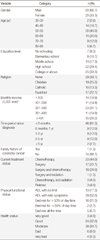Abstract
Purpose
This study aimed to investigate the influence of resilience and symptom experience on quality of life.
Methods
Seventy five patients in an active treatment stage were recruited from 2 hospitals between October and December 2010. A survey including perceived health status, physical functional status, the symptom experience index, resilience, and the functional assessment of cancer therapy-colorectal (FACT-C) was completed.
Results
The level of FACT-C was 86.61 (±18.91), which was higher than for patients with colostomy, but lower than for patients in a rehabilitation stage. Participants without physical functional limitations showed higher level of both resilience and quality of life. Participants with bad health status showed a lower level of both resilience and quality of life and higher level of symptom experience. The quality of life was related to the level of resilience (β=.373), symptom experience (β=-.292), and perceived health status (β=-3.961).
Figures and Tables
Table 3
Symptom Experience, Resilience, and Quality of Life by the Characteristics of Participants (N=75)

References
1. National Cancer Information Center. National cancer statistics. accessed on 2 October 2011. Available at: http://www.cancer.go.kr/cms/statics/survival_rate/index.html.
2. Ministry for Health, Welfare and Family Affairs. Annual report of national cancer registration project (The cancer statistics in 2009). accessed on 10 October 2011. Available at: http://stat.mw.go.kr.
3. Hwang DY. The Secret of 1.5 meters. 2003. Seoul: The Early Morning Publisher.
4. Ferrell B, Wisdom C, Werize C. Quality of life as outcome variable in the management of cancer pain. Cancer. 1989. 63:2321–2327.

5. Cotrim H. Impact of colorectal cancer on patient and family: Implication for care. Eur J Oncol Nurs. 2008. 12:217–226.
6. Park HM, Ha NS. Influencing predictors of quality of life in colorectal cancer patient with colostomy. Clin Nurs Res. 2006. 12:123–131.
8. Kim HS. The concept development of the resilience [dissertation]. 1996. Seoul: Chung-Ang Univ..
9. Kadner KD. Resilience: responding to adversity. J Psychosoc Nurs Ment Health Serv. 1989. 27:20–59.

10. Wagnild GM, Young HM. Development and psychometric evaluation of the resilience scale. J Nurs Meas. 1993. 1:165–178.
11. Strauss B, Brix C, Fischer S, Leppert K, Füller J, Roehrig B, et al. The influence of resilience on fatigue in cancer patients undergoing radiation therapy (RT). J Cancer Res Clin Oncol. 2007. 133:511–518.

12. Haase JE. The adolescents resilience model as a guide to interventions. J Pediatr Oncol Nurs. 2004. 21:289–299.

13. Sim MK. Influence of resiliency factors on adaptation in families of children with cancer. Korean J Child Health Nurs. 2004. 10:383–394.
14. Shin YH, Sim MK, Kim TI. Resilience and health-related quality of life in children with chronic illness. J Korean Acad Child Health Nurs. 2006. 12:295–303.
15. Shin HW, Lee JH. A correlation study on the resilience of children with cancer and their mothers. J Korean Oncol Nurs. 2008. 8:24–31.
16. Moon JR, Jung YY, Huh J, Kang IS, Park SW, Yang JH, et al. Relationship between depression and resilience in adolescents with congenital heart disease. Korean J Pediatr. 2006. 49:523–528.

17. Lee IS, Park YS, Song MS, Lee EO, Kim HS, Park YH, et al. A Study on the development of the Korean family resilience scale. J Korean Acad Nurs. 2002. 32:560–569.

18. Lee EK. A study on factors affecting cancer patients. J Korean Acad Soc Nurs Educ. 2007. 13:52–58.
19. Jun YI. Resilience on the therapeutic process of cancer patients who receive chemotherapy [dissertation]. 2008. Seoul: Korea Univ..
20. Shin SJ, Jung DY, Hwang EH. Concept analysis of resilience in patients with cardiovascular diseases. J Korean Acad Nurs. 2009. 39:788–795.

21. Fu MR, McDaniel R, Rhodes V. Measuring symptom occurrence and symptom distress: development of the symptom experience index. J Adv Nurs. 2007. 59:623–634.

22. Song YS. Determinants of resilience of the physically disabled at home [dissertation]. 2004. Busan: Kosin Univ..
23. Ward WL, Hahn E, Mo F, Hernandez L, Tulsky D, Cella D. Reliability and validity of the functional assessment of cancer therapy-colorectal (FACT-C) quality of life instrument. Qual Life Res. 1999. 8:181–195.
24. Kim H, Yoo HJ, Kim YJ, Han OS, Lee KH, Lee JH, et al. Development and validation of Korean functional assessment cancer therapy-general (FACT-G). Korean J Clin Psychol. 2003. 22:215–229.
25. Kim YJ, Yoo HJ, Kim JC, Han OS. Preoperative quality of life in rectal cancer patients: male vs female. Korean J Clin Psychol. 2003. 22:743–762.
26. Courneya KS, Friedenreich C, Quinney H, Fields A, Jones L, Fairey A. A randomized trial of exercise and quality of life on colorectal cancer survivors. Eur J Cancer Care (Engl). 2003. 12:347–357.

27. Han MR. Resilience, social support, spiritualty in wives of alcoholics [dissertation]. 2004. Seoul: Yonsei Univ..
28. Kwon IG, Hwang MS, Kwon KM. Quality of life of the terminal cancer patients receiving home care nursing. J Korean Clin Nurs Res. 2008. 14:103–114.
29. Yoon C, Joo HZ, Shin YD, Lee HM. A Study of the quality of life following after curative surgery for gastric cancer. J Korean Surg Soc. 2001. 60:405–412.




 PDF
PDF ePub
ePub Citation
Citation Print
Print






 XML Download
XML Download